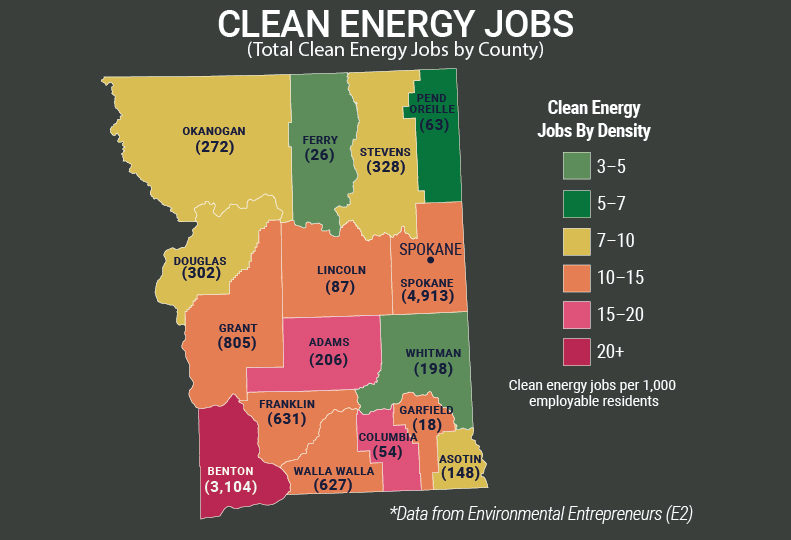
Home » Clean energy jobs become more prevalent in INW
Clean energy jobs become more prevalent in INW
Avista, Itron work to fill pipeline, recruit graduates

January 30, 2020
More than half of all jobs in Washington’s energy industry are in clean energy, according to a report released in December by Washington, D.C.-based industry group Environmental Entrepreneurs.
In Spokane County, the report says, there are 10 to 15 jobs in clean energy for every 1,000 employable residents.
As clean energy becomes a priority for companies, individuals, and municipalities, some employers here say the nature of clean energy jobs is shifting to become more technology based.
Pearl Staudinger, director of talent acquisition for Liberty Lake-based Itron Inc., a provider of energy and water resource management products and services, says clean energy jobs have been increasing over time, and the skill sets for those jobs have shifted as more green technologies have gone digital.
“We’re finding ourselves competing with technology companies,” Staudinger says. “You’re seeing a shift to more advanced technologies … across the board.”
Clean energy is energy derived from renewable, zero-emissions sources, such as hydropower or solar power, and includes energy saved through energy efficiency measures.
Jeremy Gall, manager of craft and technical training at Spokane-based utilities company Avista Corp., says the core skill sets for Avista’s clean energy jobs haven’t changed much, but the ways in which work is accomplished have shifted into more technological realms.
Staudinger says that’s also largely true for Itron. The company has shifted from focusing on the hardware of the meters it manufactures to focusing on developing the software and firmware upon which its smart meters rely.
“We also offer networking infrastructure,” Staudinger says. “That networking platform provides analytics and information that allows utilities to have real-time data.”
As companies in the energy sector integrate more advanced technology, they’re working to update the knowledge of existing employees, Gall says.
“The way that we’ve been able to keep our employees adaptable and responding to those changes and evolving with those needs is through apprenticeship programs,” Gall says.
Diane Quincy, Avista’s director of leadership and organizational development, says matching experienced employees with those who have less experience is another way Avista helps employees keep up with emerging clean energy technologies and learn how to best apply those technologies.
A variety of jobs fall under the clean energy umbrella, including more traditional roles such as wind turbine or solar array installation technician, as well as more data-based and technology-driven roles such as energy efficiency analyst and smart grid designer.
“As jobs change, we have people who understand what needs to change about procedures or the way we use data or the way that we plan for our energy mix, and we evolve through hands-on experience,” Quincy says.
Staudinger says about 10% of Itron’s hires come from Spokane-area universities, a move she says is intended to help the company to be innovative by integrating recent graduates who may have more knowledge of cutting-edge technology than their older counterparts into its workforce.
“We’re committed to bringing in people who are looking at the world in different ways than people who have been in the industry for quite some time. A lot of innovation is coming out of that,” Staudinger says. “The concerns of students who are coming out of universities today are very different from some of the concerns of people who have been in the professional world for a long time.”
Avista is focusing on filling its own employment pipeline, Quincy says, through partnerships with Spokane-area colleges and high schools, including a high school program called Energy Pathways, which is intended to expose students to careers in the energy industry.
Filling that pipeline with people who have advanced knowledge when it comes to the technology involved in a changing utility landscape is vital to Avista, Quincy says. Sometimes, the company has trouble finding those employees, she says.
“Jobs that can be harder to fill tend to be more specialized and technical in nature, such as some of the roles in our technology areas and field work that requires specific utility training and expertise,” Quincy says. “That is one factor in why we are strategic about building long-term pipelines for our future workforce.”
Even as the energy sector demands more technology-based roles, the traditional, less technology-focused jobs within clean energy remain important, says Staudinger.
“We are seeing an increase in project management and installation of these technologies in the field, whether that be in a residential context or a large commercial project,” Staudinger says.
The Environmental Entrepreneurs says about 64% of clean energy jobs are in construction fields, while 5.7% of clean energy jobs are related to manufacturing, a sector that Staudinger says remains vital to Itron’s operations.
Alison Mallahan, Itron’s senior manager of corporate communications, predicts demand for all types of clean energy jobs, from engineers to systems software developers, will continue to rise.
“As we look ahead to trends impacting our industry and therefore impacting clean energy employment, the fact that clean energy, renewable energy, and decarbonization targets are continuing to be set by states and cities will certainly impact Itron and the kind of talent that we’re looking for,” Mallahan says.
Latest News Up Close Technology
Related Articles
Related Products

![Brad head shot[1] web](https://www.spokanejournal.com/ext/resources/2025/03/10/thumb/Brad-Head-Shot[1]_web.jpg?1741642753)


